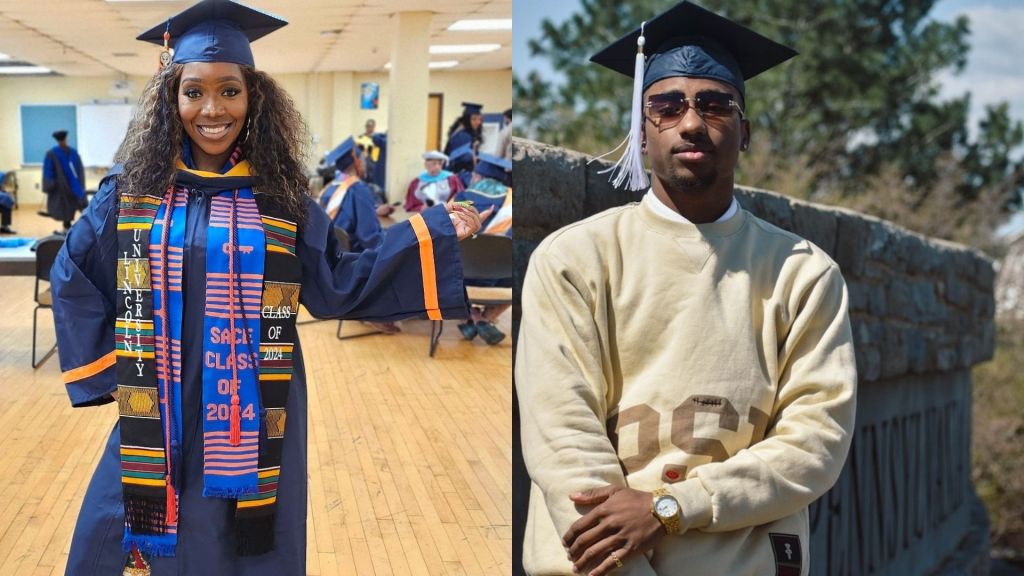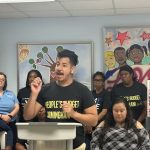By Aria Brent
AFRO Staff Writer
abrent@afro.com
As commencement season begins, the AFRO spoke with Black graduates from colleges and universities near and far about receiving their degree during a time of protests related to the Israel-Hamas war and the right to freedom of speech. Many students in the class of 2024 also either graduated high school or started college during the 2019- 2020 school year, which was derailed by the COVID-19 pandemic in March 2020.
For high school students, the contagious illness made it nearly impossible to socialize in group settings–making the cancellation of traditional events like prom and graduation nonnegotiable. For college freshman, the first year experience was curtailed as coronavirus spread from city to city, ultimately making numerous laps around the globe as different strains emerged.
Ja’Miyah Stokes, a recent graduate of Jackson State University, was a high school senior when the pandemic abruptly halted her day-to-today life.
“Not having an actual graduation ceremony was hard,” she said. “I was mad for a while because I had worked hard and had been through so much during my high school experience, so I was looking forward to my big moment.”
Kairee Hunter, 22, a native of West Baltimore, graduated from Penn State with a degree in animal science on May 4.
He started at Penn State’s Harrisburg campus in the Fall of 2019, thinking he would have a full freshman year like so many students before him. Instead, he went home for spring break in 2020 and didn’t return again for more than a year.
“It was kind of weird because we didn’t even finish the first year,” Hunter told the AFRO. “We were on spring break and they told us not to come back.”
Once the campus reopened with the option to return in his sophomore year, Hunter decided to remain at home with his family. But it was no easy feat. Hunter was trying to matriculate at a university in a degree program that was heavy with lab work for future veterinarians.
“It was weird transitioning and picking up where we left off –trying to act like nothing would be affected. It was weird in terms of the comfortability levels in the classroom. Some went back, but I stayed virtual from Fall 2020 through Spring 2021,” he said.
Throughout two years at Penn State’s Harrisburg campus, and three years at the historic institution’s main campus, Hunter overcame mountain after mountain.
First, there was the aspect of learning how to become a veterinarian– virtually.
“It made me less focused. When I was on Zoom I was more distracted,” he recalled.
Then there was the isolation. For Hunter, who was already comfortable being by himself and “marching to the beat of his own drum,” the social opportunities missed began to take their toll.
“I definitely missed out on the social aspect,” he said. “It was hard to actually envelop myself. Normally I would talk to different people, we would study together or compare assignments.” None of that was possible in a global pandemic with – at the time– no vaccine to fight it.
Looking back, Hunter is just glad he made it through and was able to actually have a graduation– something that is eluding more and more students across the nation as protests and calls for a ceasefire in the Israel-Hamas war intensify.
On Oct. 7 terrorists from Gaza shot, assaulted and kidnapped thousands of Israelis in an early morning attack, prompting an Israeli response that many say is unfairly impacting innocent Palenstinians in Gaza. Now, American college students are protesting, staging sit-ins and calling for the U.S to stop Israel’s plan to wipe Hamas “off the face of the earth,” according to the words of Israeli Minister of Defense Yoav Gallant.

Credit: AP Photo
“It’s not at all fair,” said Hunter, speaking on the canceled graduation ceremonies being canceled as American students demand divestment from Israel and call for the country to stop the brutal attacks in Gaza.
“I don’t think that schools are responding in the appropriate way by calling the police, tearing down the camps and taking away the graduations. This is our Constitutional right,” said Hunter. “It’s very backwards.”
President Joe Biden recently spoke on the chaos unfolding across the country on college campuses. “Violent protest is not protected – peaceful protest is,” said Biden. “Vandalism, trespassing, breaking windows, shutting down campuses, forcing the cancellation of classes and graduations – none of this is a peaceful protest.”
Biden also spoke against protestors that threaten or instill fear in others.
“There is no place for hate speech, or violence of any kind: anti-semitism, islamophobia, discrimination against Arab-Americans or Palestinian-Americans,” said Biden. “It’s simply wrong. There’s no place for racism in America.”
The University of California, Los Angeles (UCLA) is one of the universities throughout the U.S. that has canceled their classes due to protests and encampments turning violent.
Jenae Talison is a second year graduate student at UCLA who has watched over the last two weeks as the turmoil on campus has unfolded. As graduation approaches, she noted that the ongoing protests on campus have resulted in an increased police presence and disruptions to campus activities.
“We’ve been virtual for like the last two weeks and it’s been weird having to continue life as a student like people aren’t being attacked and arrested down the street,” stated Talison. “They just randomly emailed us about classes being virtual and the abruptness of it all reminded me of COVID.”
The soon-to-be graduate explained that although she lives off campus, the effects of the protester and police interaction have affected her motivation to finish classes strong this quarter. She recalled the events that happened on campus that led up to the current environment the student body is dealing with. Talison clarified that UCLA is still scheduled to have their main commencement ceremonies the weekend of June 14 to June 16, however she is fearful that they’ll cancel them in the month they have left before the big ceremonies.
“They canceled USC’s ceremony and I’m a little nervous we’re next. We’re a public university so our policies for protesting are a little different, but they’ve been enforcing similar police protocols for the protesting that’s been happening,” she stated. “We need more security for the students’ safety.”
Although institutes like Columbia University and the University of Southern California have canceled their commencement ceremonies, other colleges, like Lincoln University in Philadelphia, have held their graduation exercises according to plan. On the list of 2024 graduates were two special names: Ericka Alston Buck, the AFRO’s arts and culture writer, and the legendary icon, Stevie Wonder, who received an honorary doctorate of humane letters. Alston Buck has been working on her undergraduate degree in human resources for two decades. On May 5, she walked across the stage and officially earned her degree after the challenges of adult life, parenthood and a global pandemic.

Credit: AP Photos
“Lincoln University understands the needs of adult students. Being able to graduate while working full time and being a parent made this 20-year journey possible for me,” said Alston Buck. “Receiving my degree on the same day that Stevie Wonder received his honorary doctorate made the moment all the more special. He is an iconic figure in the music industry and a champion for social causes.”
“He epitomizes the spirit of excellence and service that Lincoln University instills in its graduates,” Buck continued. “His presence added an extra layer of significance to an already momentous occasion.”
Stevie Wonder’s next commencement stop will be the Peabody Conservatory in Baltimore, where he is set to speak on May 23 after Misty Copeland gives her address at the institution on May 22.
AFRO Political Reporter Tashi McQueen contributed to this article.
The post Commencement season 2024: College seniors speak on graduating in tumultuous times appeared first on AFRO American Newspapers.










